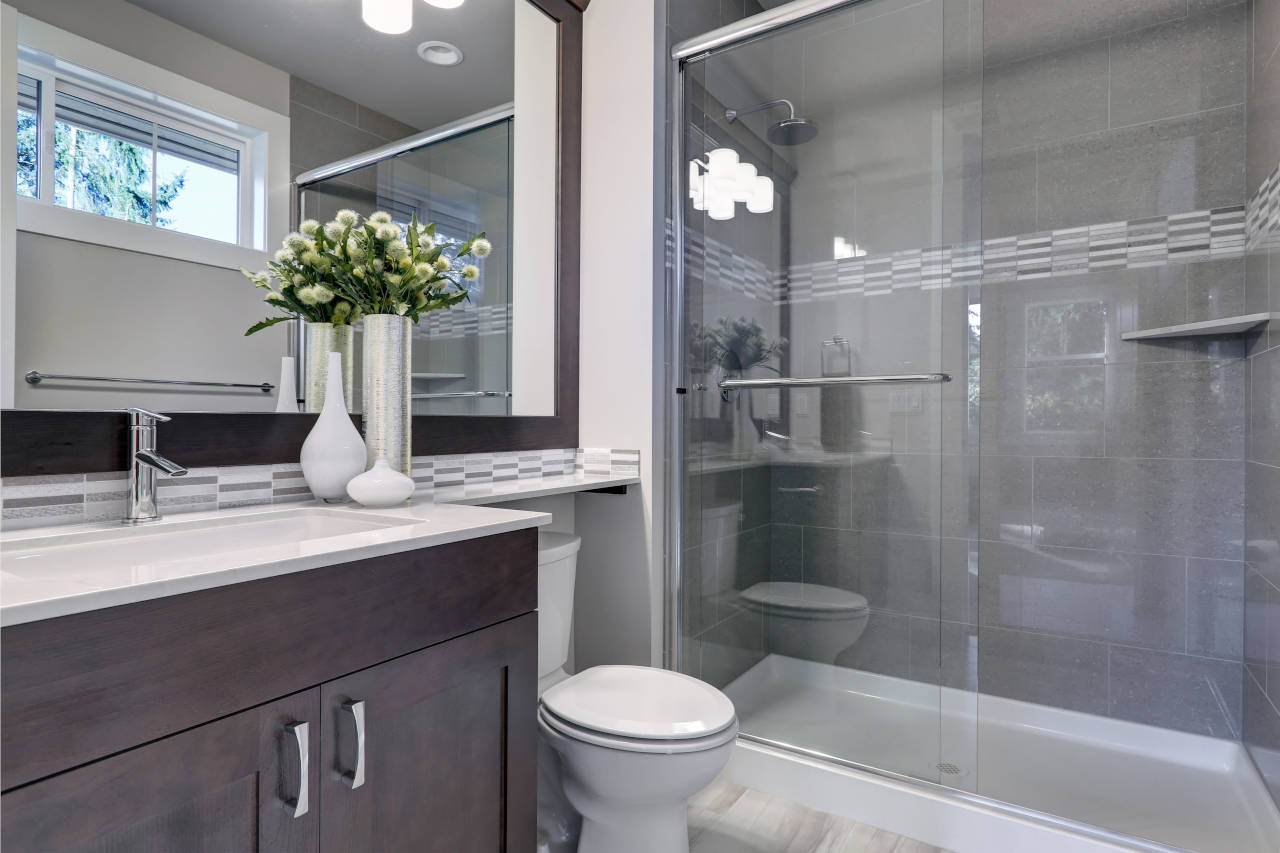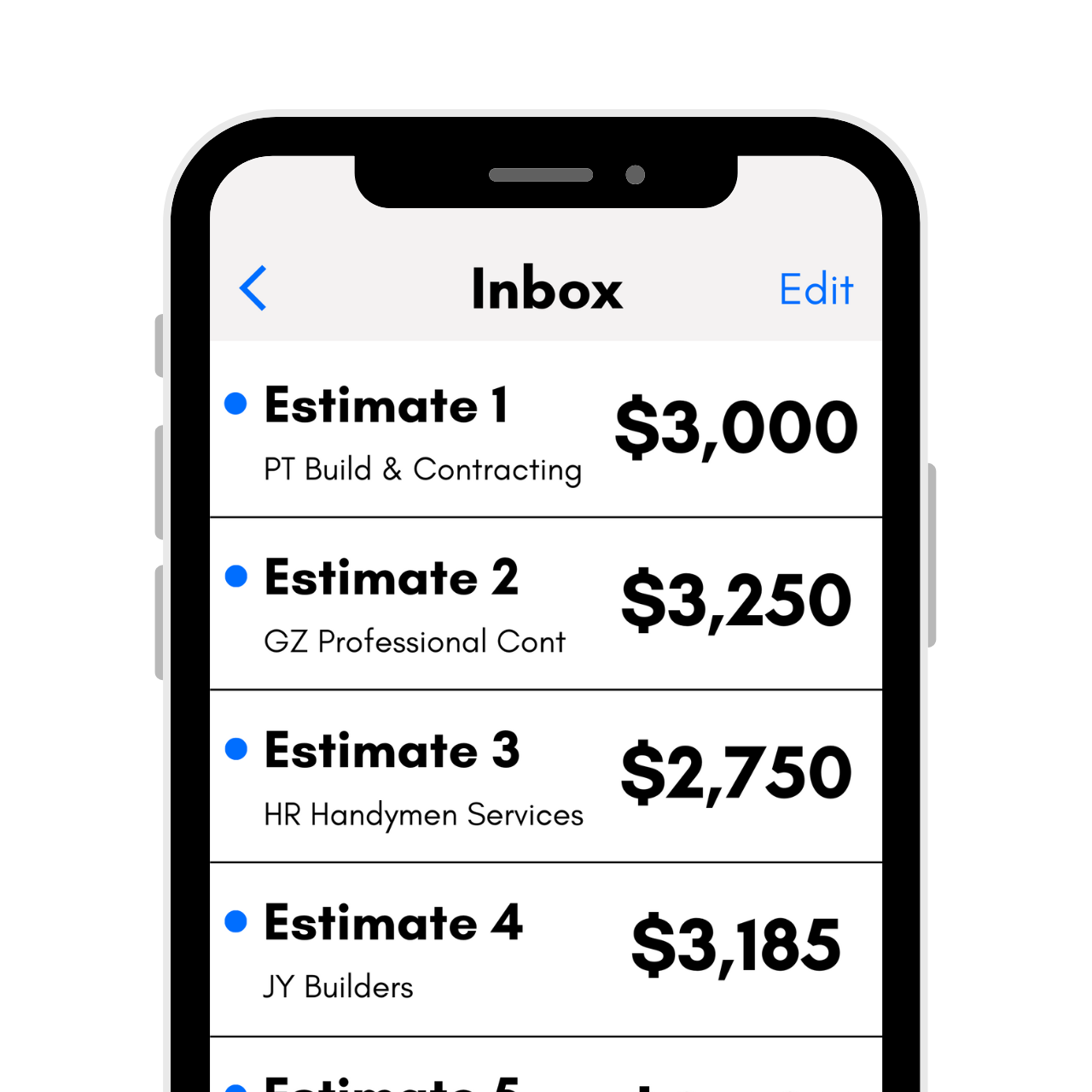Bathroom Renovation 2025 Cost Guide
Are you planning a bathroom renovation? If your bathroom is old, out of date, or not meeting your needs, a renovation can breathe new life into the space.
Bathroom renovations can be cosmetic, partial, or full, which can lead to a wide range of costs. Estimate the price of your upgrade using our bathroom remodel price calculator or continue reading to learn more about the cost to remodel a bathroom below.
Bathroom Renovation Cost Calculator
Configure your project below to estimate the cost using 2025 price data. Continue reading below to learn more about what to expect for a bathroom renovation project.
On this page:
How Much Does a Bathroom Remodel Cost?
The best approach to a bathroom renovation is to decide what you want to do, list out what each item will cost, and then look at your budget. This will allow you to adjust the scope of your project if necessary.
If your bathroom is functional but dated, a cosmetic or surface renovation is the least expensive, with the highest rate of return. However, if your bathroom has other issues, like poor layout, mold, or lack of space, a full renovation may be required.
Full renovations remove everything down to the studs and change the layout or enlarge the size of the space. Partial renovations also remove everything down to the studs but keep things where they are when replacing.
All three will give you a brand new bathroom, but they have very different costs, with cosmetic remodels being the least expensive, and full remodels costing the most at close to $650 per square foot of space remodeled.

Remember, however, that a bathroom renovation could result in a substantial return on investment (ROI) at resale. In fact, Remodeling magazine’s most recent Cost vs. Value report indicates that homeowners are seeing close to a 67% return on investment for mid-range bathroom remodels.[1]
Remodeling magazine puts the average cost of a mid-range bathroom remodel at just over $24,000 for the full renovation of a 5′ x 7′ bathroom with basic fixtures and ceramic tiles. A cosmetic remodel is generally cheaper at around $8,000 for the same size space.
Full remodels of larger bathrooms, such as an en suite, can cost $100,000 or more depending on the materials used and the level of renovation.
Looking at a few of the expense factors will give us a better understanding of why bathroom remodels can cost so much.
Location
The location of the renovated bathroom in the home will affect the price. Upgrading a second-floor bathroom may cost more if you need to run new pipes there or need heavy fixtures installed. Likewise, if you need the floor reinforced to hold heavy fixtures.
The same might be true of a mother-in-law suite in the basement or over the garage. If you choose to use universal design principles in the remodel, such as making it more accessible, including taller fixtures, space for a wheelchair, or grab bars, this can also increase costs.
Plumbing and Electrical
Making significant changes to existing plumbing and electrical systems will require more work and effort from skilled trades to complete the work.[2] In addition, the work required to relocate pipes might also require significant repair work to other areas of the home.
Size
A half bath will cost much less than a full bathroom to remodel. Converting a half bath into a full bath could require additional plumbing, more lights and fixtures, a bigger exhaust fan, a new vanity, new tub, shower, or combination, and repairs to walls and ceilings.
Materials
Although building materials vary slightly in cost from location to location, your choice of materials can make a huge difference when you choose marble or quartz tiles and countertops over ceramic or porcelain. A jetted whirlpool or walk-in tub will cost a lot more than a standard tub.
One method to save significant money on materials is to comparison shop and wait for sales on large, high-quality items like the tub, toilet, or vanity.
Labor
Where your home is geographically located will affect labor costs. What’s more, the expense of worker salaries will make up 45 – 65 percent of your project’s total budget.
Even small projects you can DIY will affect labor costs significantly. For instance, if you could design your renovation yourself, you could save $250 – $500, especially if you are proficient with design software.
Let’s take a look at the various projects, how much each costs, and what’s involved. Then you can decide whether to DIY or hire professionals.
Our estimated prices will also help you decide which estimates are reasonable. Another consideration is that each of these projects considered separately typically costs more than as a bundle.
Tile & Flooring Costs
A great place to start is our tile calculator, where you can input your dimensions, and the program will figure out how many tiles and supplies you need and an estimated price.
Of course, the estimated cost will depend on the tile you choose. Before deciding, consider reading our bathroom tile flooring cost guide, which will give you ideas on what tiles you could use and where.
Plus, if you want to add a heated floor, the average price is $585, typically $5 and $12 price per square foot. If you want to extend the heating into wet areas and need to waterproof the cables, this cost rises to $15 to $20 per square foot.
You could use the same type of tile on the walls and in the shower as on the floor. However, it would be best if you did not use color-backed glass or ceramic wall tiles on the floor. Those are too delicate for the weight. Moreover, slip-resistant tiles should be used on the floors.
If you tile the shower floor, the tile must be 3″ or smaller in size to slope to the drain. Keep in mind that while floor tiles can always be used on the walls, tile rated for wall use cannot be used on the floor.
However, mixing and matching is a great way to produce a dynamic and interesting bathroom design. Ceramic wall tiles and porcelain floor tiles can create a range of looks from retro to contemporary.
Walls & Ceiling Costs
When upgrading from a half bath to a full bath, you will likely need framing and drywall, regardless if you will paint, add texture, or tile. Use our drywall calculator to determine how many sheets and supplies you will need for the walls and ceiling.
Depending on the size of the upgrade, plan about $750 – $2,500 for studs, drywall, labor, and supplies.
Bathtub & Shower Costs
Although the average cost for installing a new shower is $2,000 to $9,000, our shower price calculator can help narrow down the cost for your project. The cost of a shower is generally the plumbing, framing, waterproofing, tile or fiberglass surround, and glass door.
Installing a shower & tub combination or a fiberglass shower stall averages around $1,200 to $8,000. A custom tile shower, on the other hand, ranges from $1,500 to $3,500 just for the tile installation.
Fixtures usually run $200 to $4,000, and a glass door can range from $550 to $8,000.
If you’re considering adding a separate bathtub, plan on spending around $2,500 to $10,000, depending on the type. Using a shower/tub combination can reduce your costs. However, when you choose a whirlpool or jetted tub, it could drive your cost even higher.
Toilet Costs
A new or replacement toilet will average $400 to $800 with installation. However, the toilet is not a place to cut corners. Installing a cheap toilet will just lead to leaks and repair costs.
The price of a toilet increases if you choose a self-cleaning commode, tankless, or corner toilet.
You should estimate about $1,500 or more for additional plumbing, especially if you are moving the toilet or adding a shower or tub.
Vanity, Countertop, & Cabinets Costs
Most bathroom designers recommend allotting 20% – 25% of your budget for the vanity, cabinets, and countertops. Bathroom vanities can range from $250 to $3,500 or more, depending on the grade.
A stock retail-grade vanity without a sink might be on the lower end of the spectrum, while a custom-built hardwood cabinet will be on the higher side.
Countertops are sometimes included with the vanity, but often they are selected and installed separately. A small countertop and sink might run a few hundred dollars, while a large double vanity granite countertop with sinks might be $3,000 or more.
If your countertop does not come with a sink attached, adding the sink could cost $200 to $2,000, and faucets can cost around $300 to $500 on average.
Lights, Vents, & Electrical Receptacles Costs
Electrical for the bathroom consists of a GFCI receptacle, lighting, and a ventilation fan.
A new ventilation fan costs about $375 installed, but when you add a light and heater, it could cost you another $100. There are even some fans with integrated speakers so you can listen to music in the shower.
Electrical receptacles need to be ground-fault circuit interrupter (GFCI) outlets, which is required by code. An outlet costs about $130 to $300 installed.
Recessed lights are an inexpensive option in the bathroom, though many prefer LED strip lights around the mirrors to eliminate shadows for makeup application and shaving.
DIY Savings
How much you DIY will depend on your skills and time. When you only have one bathroom, you won’t want to wait the months it might take to complete a renovation on nights, weekends, and holidays if you don’t have the vacation time.
To save money, you might let a general contractor do the majority of the work and leave you some small projects you can do at your leisure.
One big place to save is on the tear-out. You can save $500 to $2,000 by doing this step yourself. Just make sure you shut the water and electrical off before you begin, and that you have a way of disposing of the waste.
Getting Renovation Estimates
With so many skills required for a successful renovation, it is often best to hire a general contractor who works with plumbers, electricians, tile installers, and other specialties.
Many of these tasks will need to get subcontracted. A contractor knows the people who do the best work in these areas and will be responsible for the entire project.
Make sure to discuss who will get the building permit. You don’t want the renovation delayed because no one gets the permits, which usually cost $400 to $750 or more from the building inspector’s office.
Whichever you choose, DIY, contractor, or a combination, make sure you have a plan for a bathroom if there is only one in the house or plan the project while you are away on vacation.
All pricing information on this page is based on average industry costs, and is subject to variance for project-specific materials, labor rates, and requirements.
References
- Remodeling, 2023 Cost vs Value Report, https://www.remodeling.hw.net/cost-vs-value/2023/
- Building Pros, 5 Factors that Affect the Cost of a Bathroom Remodel, https://bldgpros.com/5-factors-that-affect-the-cost-of-a-bathroom-remodel/



